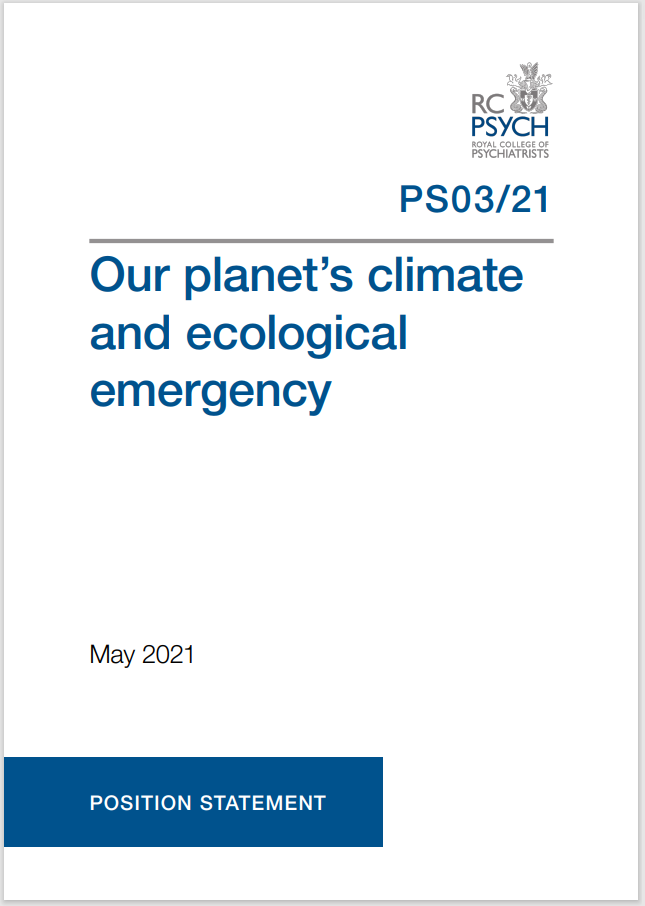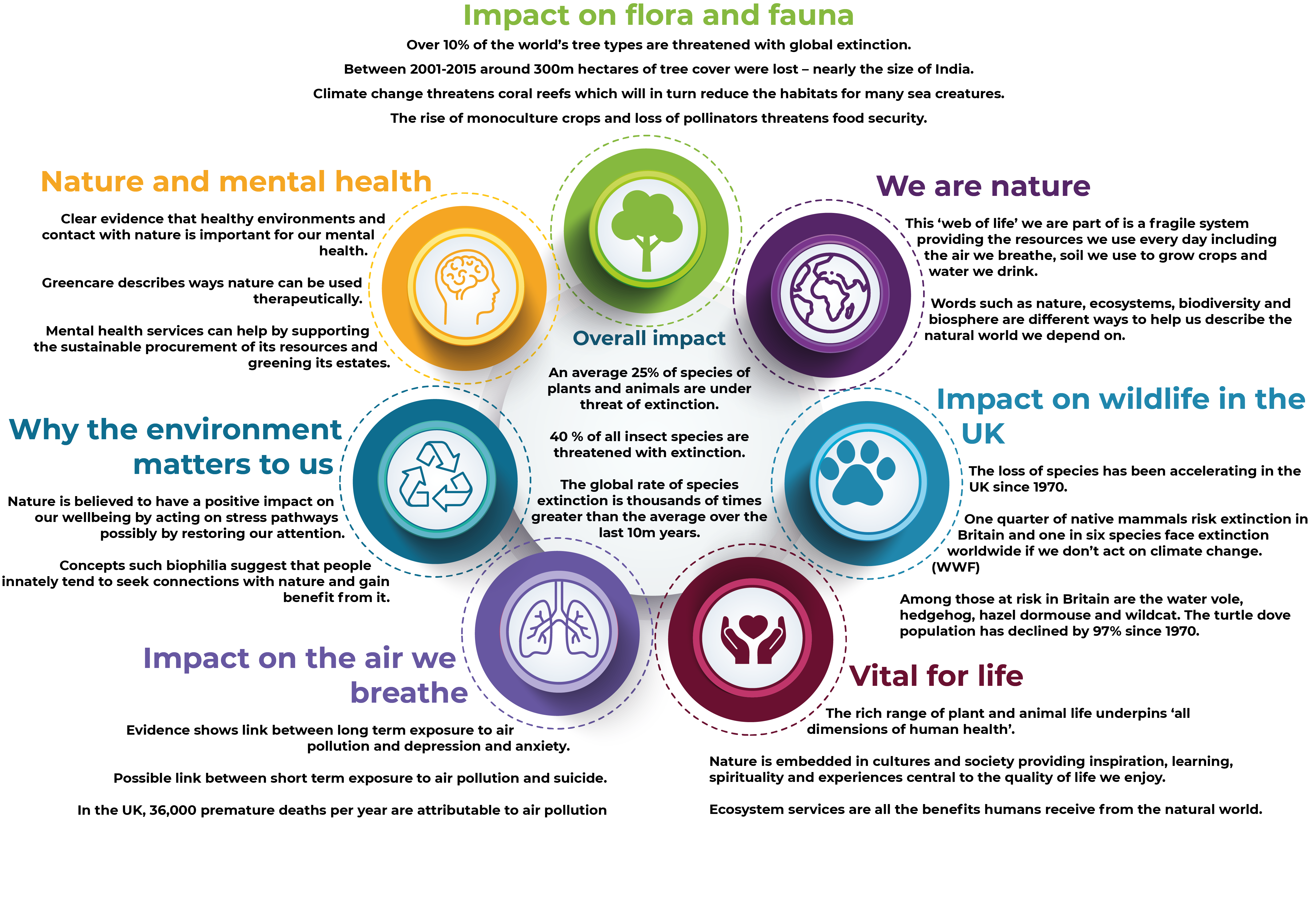The College's position on sustainability
A climate and ecological emergency
The disruption to life posed by climate and ecological degradation is a crisis which presents an unprecedented threat to human health.
The College's position statement is a 'planetary diagnosis' of the ongoing climate and ecological crises, in which we outline 'treatments' which are achievable by RCPsych.
We are declaring a climate and ecological emergency.
On this page
On this page we summarise the position statement, which you can also download and read in full.
We set out
- what we have pledged to do
- our recommendations for action by others
- how the climate crisis and ecological crisis each are contributing to a mental health emergency.
The full statement also provides in more detail
- information about the psychological dimensions to the crisis
- ways in which mental health services can form part of the solution.
The position statement in full

Key messages from the position statement
Climate change, pollution and biodiversity loss
- have created a health crisis and it is imperative that psychiatrists are informed about and actively engaged in these issues.
- are interconnected factors which individually and collectively have a profoundly destructive impact on human and planetary health. Our actions and their impacts will be inherited by the generations to come.
- have particular implications for mental health and disproportionately affect vulnerable groups, including persons with pre-existing mental illness and children.
A sustainable and positive vision of mental health services will require a greater understanding, adoption and integration of preventative principles and interventions. This preventative ethos must be placed at the heart of healthcare:
- The NHS is a major contributor to carbon emissions – in England it accounts for 4-5% of the total (NHS England 2020a).
- Improving NHS sustainability cannot be achieved merely through rationalising estates, it must involve a more holistic approach to health creation, health protection, and a model of healthcare where prevention is prioritised by services.
- Detecting and treating illnesses early to halt or slow their progress can reduce relapses, and prevent patients deteriorating to the point of needing hospitalisation; this approach increases efficiency and is an essential part of making healthcare more sustainable.
- Preventative healthcare is not an alternative that will undermine medicine, but rather champions wellness and seeks to mitigate the incidence and progression of illnesses where possible.
The Royal College of Psychiatrists’ pledges to:
- Commit the College to an ambitious plan for sustainability, including a pledge that by 2040, we will achieve Carbon Net Zero for those emissions it directly controls.
- Promote prevention in psychiatry, showing how detecting and treating illnesses early to halt or slow their progress is an essential part of making healthcare more sustainable.
- Integrate this work throughout the College to develop a wider sustainable network and promote learning.
- Support the creation of an alliance across mental health organisations to better represent the mental health impacts of, and potential solutions to, the climate and ecological emergencies.
- Empower patients to make informed choices in their care and engage them in the development of mental health services that are collaborative and sustainable.
- Continue supporting the integration of social prescribing and nature-based care into mental health services.
Recommendations
- Every NHS health organisation, commissioner and provider to produce a Green Plan by the end of 2021.
- Mental health provider organisations should develop and implement a biodiversity action plan which examines greening (incorporating more environmentally friendly systems) of estates, buildings and care pathways and establishes links with green care providers.
- Establish a natural services network to map all sites in their local area that provide opportunities for sustainable interaction with nature and/or activities that preserve the natural environment and promote these to mental health services.
- Incorporate the goals of Choosing Wisely into daily practice, including:
- Encouraging doctors to provide patients with resources that increase their understanding about potential environmental harms of biomedical/pharmaceutical interventions and help them understand that doing nothing or fewer interventions can sometimes be the best approach.
- Encouraging and empowering patients to ask questions such as, “Do I really need this test or procedure? What are the risks? Are there simpler safer options? What happens if I do nothing?”
- When fully established in England, all Integrated Care Systems (ICS) to appoint a social prescribing lead to oversee all community teams developing a social prescribing function to identify local opportunities for complementary health improving activities with similar initiatives across the Devolved Nations, including the Integrated Joint Boards in Scotland.
- Commissioners to embed social prescribing into community and inpatient mental healthcare and not limit this treatment option to primary care.
- Expand the NHS sustainability awards. Continue recognising sustainable clinical work across the NHS with consideration towards developing an additional award for the work of mental health services in achieving a high standard of sustainable practice.
- Governing NHS bodies across UK to jointly develop a minimum set of standards for providers in developing sustainable services.
- Commissioners to include these minimum standards in their contracts.
- Commissioners to develop a sustainable mental health service toolset: Provide a working set of standards by which mental health services can develop effective sustainable development plans which reflect the need for estates and clinical staff to work collaboratively when developing and delivering sustainable mental health services.
- Research organisations to ensure future research in planetary health includes multidisciplinary studies examining how the mental health of different vulnerable groups are affected by climate-related hazards, pollution and biodiversity loss.
- Research organisations to establish and quantify the co-benefits to mental health of taking action against climate change, biodiversity loss and pollution.
- Medical School Council to ensure the impact of the climate and ecological emergencies, and the role medical professionals can play in preventing and mitigating this, are a core part of curriculum.
- Medical School Council to work with medical schools to ensure students are taught about overuse of tests and interventions.
- Organisations responsible for postgraduate and continuing medical education should ensure that practising doctors receive similar updates to undergraduates.
- To prioritise a unified approach with sufficient resources to tackling the climate and ecological crises across all aspects of government.
- To establish an authority that can lead on public mental health and preventative healthcare, tackling social determinants of mental health early.
- Follow the UKHACC Principles for a healthy and green recovery to place environmental and health factors at the heart of any economic recovery following the COVID-19 pandemic.
- Base decisions to changes in land and water usage on tools which include assessment of prospective impacts to mental and physical health.
What the RCPsych is doing
This year our College sustainability strategy will:
- Begin with the declaration of a climate and ecological emergency.
- Show how the College will reach net zero for those emissions it directly controls by 2040, in line with the Greener NHS plan.
- Establish a baseline for the College’s current environmental impact.
- Measure, monitor and report progress on the plan.
- Commit to represent and advocate the links between health and the ecological emergency.
This work will be integrated across the College to develop a wider sustainable network and promote learning on the climate and ecological emergencies by:
- Establishing a Start and Finish Group to work across the College which coordinates the College’s sustainable transition.
- Embedding sustainability in College quality improvement activities, Faculty accreditation and accreditation schemes.
- Organisation of College functions and conferences to adopt sustainable event planning guidance of the highest and most recent standard.
- Developing a Champion role for the climate and ecological emergencies within each of our faculties to promote engagement across psychiatry.
- Supporting the College in the Devolved Nations to develop ambitious responses to the climate and ecological emergencies that are relevant to their health services and jurisdictions.
- Embedding principles of sustainable mental health care and the impact of the climate and ecological emergencies in the curricula by 2022.
- Build on the Green Scholar and Sustainability Scholar roles.
We will advocate for action by government, NHS leaders and research bodies to promote sustainability and tackle the climate crisis by:
- Reaching across the mental health sector to further public and governmental understanding of the wide-ranging health impacts of the climate and ecological crises, with emphasis on how they relate to mental health.
- Using the College’s networks to lobby Government and the NHS on policies and decisions which do not adequately acknowledge the mental health consequences of the climate and ecological emergencies.
- Encourage research funding bodies to promote work highlighting the mental health impacts of the Climate and Ecological emergencies.
We will collaborate with other partners in mental health by:
- Supporting the creation of an alliance across mental health organizations to better represent the mental health impacts of and potential solutions to the Climate and Ecological Crises and the integral role healthy nature plays in our well-being.
- Collaborate with partners to develop actions which coincide with COP 2026.
We will engage with members, patients and carers across the UK and internationally to develop awareness of the climate and ecological crises as a mental health crisis. This will involve work on:
- Promoting prevention in psychiatry by recognising and responding to the social and environmental determinants of mental ill-health. Integrating a public mental health perspective throughout the College to promote sustainable psychiatric practice.
- Promoting guidance for healthcare providers to support them to develop and evolve services so that they fit in with the NHS pledge to be net zero by 2040.
- Prescribing guidance: medications and their prescribing have a substantial carbon footprint. There are sustainable forms of prescribing which can markedly reduce the carbon footprint of a patient's care without impacting on quality of care.
- Promoting ways we can empower patients to make more informed choices in their care as outlined in the Choosing Wisely campaign and to encourage patients to assist in the development of mental health services that are more collaborative and sustainable.
- CPD development through the creation of education resources for members to support their understanding of the impacts of climate change on mental health and mental health services.
- Providing international members with increased online support to help promote sustainable mental health provision around the world.
- Engaging with patients and carers to help them play a part in designing new, sustainably focused health services.
- Including and involving the voice of young people, encouraging a sense of agency in how their future is to be determined, promoting self-esteem and resilience.


